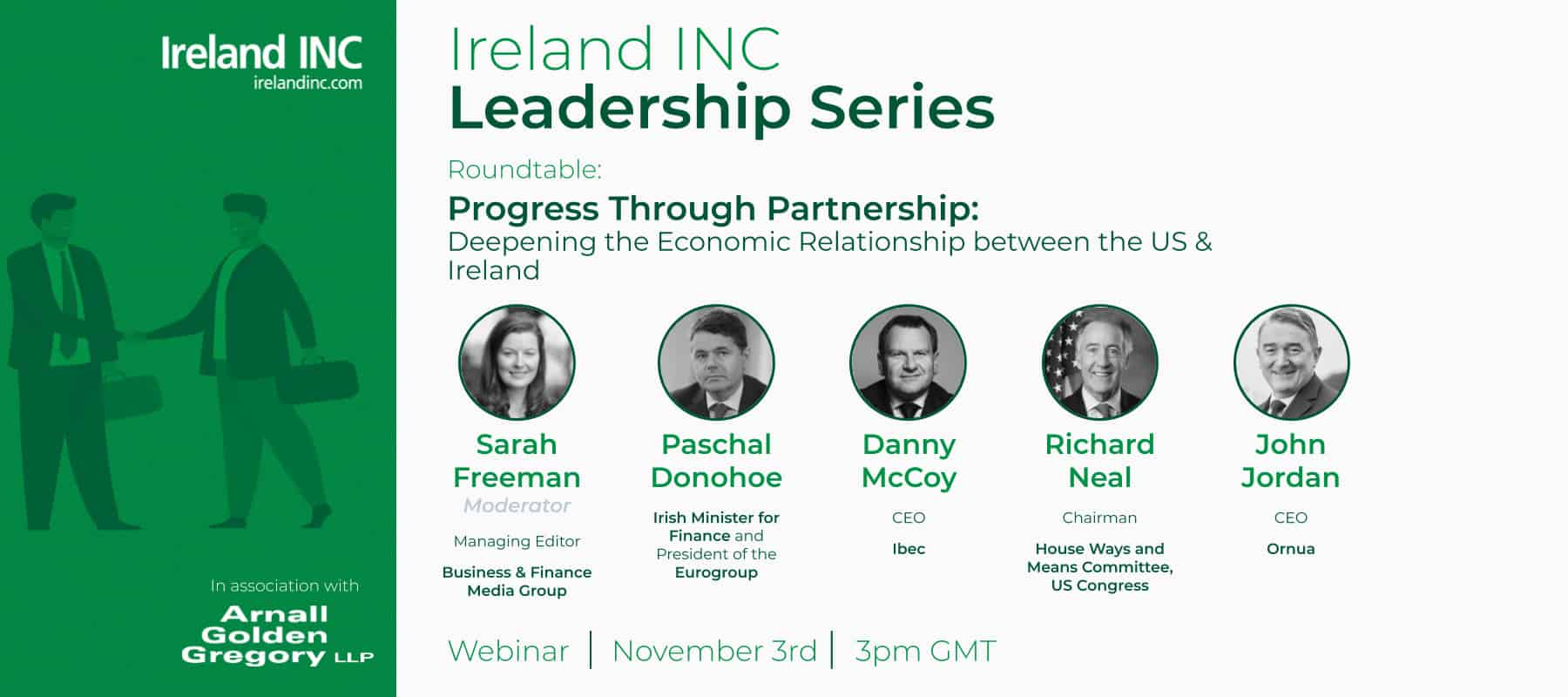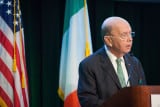Seven key takeaways from the Ireland INC US-Ireland Economic Roundtable in association with Mike Burke from Arnall Golden Gregory LLP
‘Progress Through Partnership: Deepening the Economic Relationship between the US & Ireland’ was the theme discussed by guest panellists Congressman Richard Neal, Chair of the House Ways and Means Committee, Minister for Finance and President of the Eurogroup, Paschal Donohoe; John Jordan, Chief Executive of Ornua and Danny McCoy CEO of IBEC during a roundtable yesterday afternoon. The roundtable was moderated by Sarah Freeman, Managing Editor of Business & Finance Media Group.
If you missed the roundtable, you can see it here
U.S. Ambassador to Ireland, his Excellency Ed Crawford, opened proceedings by referencing the relationship between Ireland and the US as ‘best friends’. He spoke about his pride in his Irish roots and how his mother travelled to the US in 1925, to make a new life for herself there.
Ambassador Crawford then introduced the U.S. Secretary of Commerce Wilbur Ross, who spoke about the significant role Irish immigrants played in the American War of Independence and the importance of continuing to nurture and grow our cultural, social and economic ties. He referenced the US stock of FDI in Ireland totalling over 354 billion dollars last year, with 700 American companies supporting roughly 155,000 Irish jobs. He noted;
Ireland is globally renowned for being one of the most innovative countries in the entire world.
Here are seven key takeaways from the roundtable:
1. The current US administration has chosen to use tariffs to gain traction in trade disputes. The best way to handle the issue going forward is diplomatically.
Congressman Richard Neal spoke about what policy makers can do to make it easier for Irish companies to expand. He said trade discussions do not have the popularity they once did and that getting constituents to engage on trade is difficult, noting:
First of all, there’s the long historical relationship and the acknowledgement that our cultural institutions as well as our governmental institutions are very similar in nature. I’ve pursued a pretty assertive policy in working with the US trade ambassador Bob Lighthizer as to the application of tariffs … I’ve always thought the threat of tariffs was more effective than the actual implementation of tariffs.
He noted that it’s really the consumer who pays the tariff and that protectionism harms the growth of the economy and that resolving this issue would make a good deal of sense.
President Trump figured out the politics and emotions involved and he took a very hard line on trade and blamed it for all the ills in America and took the position that tariffs, emotionally driven, would solve the case.
2. The tariffs are penalising Ornua, not Europe. The country’s largest dairy company and Ireland’s first ever billion dollar food brand exports 90% of the butter from Europe into the US.
CEO of Ornua, John Jordan, noted the implications of the tariffs on their own plans for expansion:
Part of the challenge is that we’d invest more and faster for growth but are hampered by tariffs. That dispute around support for Airbus resulted in additional tariffs being brought in this time last year on European goods. Butter got hit by a 25% additional tariff. Ornua exports 90% of the butter from Europe into the US so it’s not a tariff penalising Europe, it’s a tariff penalising Ornua and ultimately penalising Irish farmers.That tariff is an additional 60 million dollars a year.
3. Post-Covid trade must be mutually enriching and honest
Minister Paschal Donohoe elaborated on US FDI into Ireland as an absolutely essential element of our economic success. He said that Ireland acted as a bridge for American companies selling into Europe and across the world and the nature of that investment meant 160,000 jobs that are either directly or indirectly created by US companies in Ireland.
Minister Donohoe said it was necessary to elevate the discussion on trade:
For those of us that want to make the case for trade as a driver of an improvement in living standards for our citizens, we need to ensure it delivers more against that premise. We need to ensure, as trade begins to develop post-Covid, that we engage very honestly with each other to ensure it is mutually enriching and that we do acknowledge the issues and concerns that are there about whether the further development of global trade is to the benefit of many. If we can address that concern, it offers another building block for how we can drive the relationship between Ireland the US and the EU to an even higher and more positive level now and in the years to come.
4. We need to see the future as much about services and capital movements as goods
Danny McCoy, CEO of Ibec, spoke about the importance of recognising that when it comes to trade, there is no Irish US trade policy, it’s an EU policy. As an important member of the European Union, it’s necessary to consider that context. He spoke about the need to see the future as much about data and services and capital movements as goods.
Europe is well capable on the tariff front themselves to engage with it. We’ve seen that from the Boeing Airbus, we need to ramp that back down because in terms of world order it’s important that the US and the EU are actually together. Goods are a major contributor but we’re increasingly talking about services, data and we need that agreement to set the new world order for this intangible economy that we’ve discussed before and the Minister is at the vanguard internationally in that conversation.
5. Relationship between Ireland and the US and Europe and the US
Minister Donohoe addressed how Ireland’s role with the US might develop and in turn, Europe’s role with the US.
I hope that the role and relationship Ireland has with the US will continue to develop in years to come. The foundation is strong a cultural one based on ties of family, history and travel. I’m confident we’ll grow and protect that. The practical challenge now is of travel – I hope that practical linkages between the two countries can redevelop all over again. That’s the lifeblood of the modern relationship we have.
Minister Donohoe spoke about the importance of getting the relationship between the US and EU to a healthy place and working really hard to use that as a basis for a trading relationship.
6. The importance of the Good Friday Agreement reiterated
Congressman Neal reiterated his resolve that there will be no trade deal between the US and the UK if the Good Friday agreement is compromised. He noted that America is a guarantor to the Good Friday Agreement and described the dispute as the longest standing political dispute in the history of the western world. He said:
If there is any threat to the Good Friday Agreement there will be no bilateral trade agreement between UK and US and more importantly, any argument that would reestablish that border would be ill-met by Congress.
7. Recent ruling from the Court of Justice of the European Union (CJEU) regarding freeflow of data has serious repercussions for the economic relationship between US and EU
U.S. Secretary of Commerce Wilbur Ross spoke about his concern over the Court of Justice of the European Union ruling on 16th July regarding the Schrems II case which, he says, has complicated the freeflow of data that undergirds most innovative relationships between the United States and Europe. He said the ruling had negative implications for the viability of using standard contractual clauses, binding corporate rules and other mechanisms for EU US data transfers, noting, “Those underpin our 7.1 trillion dollar transatlantic relationship.”







